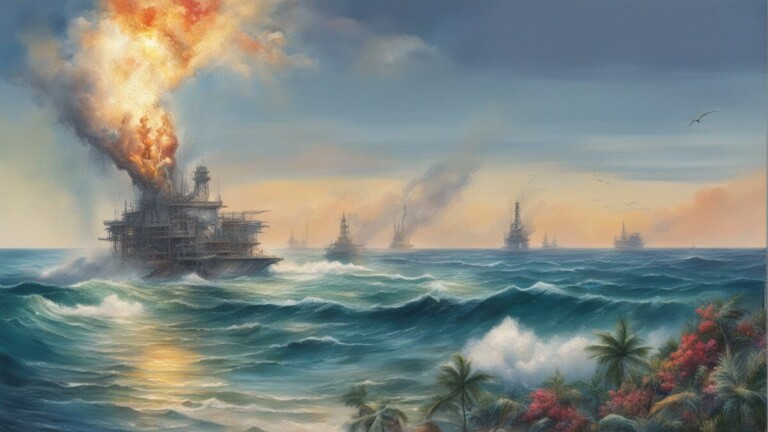The Deepwater Horizon Theory: Unveiling the Depths of the Disaster
The Deepwater Horizon Theory revolves around the catastrophic explosion and subsequent oil spill that occurred on April 20, 2010, at the Deepwater Horizon drilling rig in the Gulf of Mexico. This incident, one of the largest environmental disasters in history, gave rise to a range of conspiracy theories. This article delves into the events leading to the disaster, explores the various conspiracy theories that emerged, examines the role of government and corporate entities, and evaluates the implications of conspiracy theories in the context of environmental disasters.
The Deepwater Horizon Disaster: A Tragedy Unfolds
Background of Offshore Drilling
The Deepwater Horizon, owned by BP and operated by Transocean, was a massive offshore drilling rig involved in the exploration and extraction of oil reserves deep beneath the Gulf of Mexico’s waters.
The Explosion and Oil Spill
A massive explosion ripped through the rig, triggering a fireball and causing the rig to sink two days later. This catastrophic event resulted in the release of millions of barrels of oil into the Gulf of Mexico over a span of months. The disaster led to the loss of lives, environmental devastation, and economic repercussions for the Gulf Coast region.
Conspiracy Theories and Their Genesis
Questioning the Official Narrative
In the aftermath of the Deepwater Horizon disaster, a range of conspiracy theories emerged, fueled by a mixture of public outrage, distrust of corporate and government entities, and a desire to find alternative explanations.
The Sabotage Theory
Some conspiracy theories assert that the Deepwater Horizon explosion was a deliberate act of sabotage by various actors with ulterior motives, ranging from eco-activists to foreign governments. This theory challenges the notion of the incident as an accident.
The Role of Government and Corporations
Regulatory Failures and Corporate Accountability
The disaster revealed shortcomings in regulatory oversight and corporate accountability. The revelation of safety lapses, inadequate contingency plans, and profit-driven decisions highlighted a complex interplay between corporate interests and governmental regulations.
Public Skepticism and Accountability
The public’s skepticism of official accounts and responses to the disaster created an environment where conspiracy theories could thrive. The perceived lack of transparency and accountability further fueled suspicions about the true causes of the disaster.
Implications of Deepwater Horizon Conspiracy Theories
Erosion of Public Trust
The proliferation of conspiracy theories can erode public trust in official narratives, creating an environment where misinformation and skepticism prevail. This erosion of trust complicates efforts to address environmental crises and implement effective measures.
Focus on Accountability and Prevention
Conspiracy theories, while often unfounded, underscore the need for transparency, accountability, and preventative measures in industries with potential for catastrophic accidents. The Deepwater Horizon disaster serves as a reminder of the importance of prioritizing safety over profit.
Navigating the Intersection of Truth and Speculation
Critical Thinking and Media Literacy
The Deepwater Horizon conspiracy theories highlight the importance of critical thinking and media literacy in an era where information can spread rapidly and unchecked. Encouraging individuals to evaluate sources and evidence critically is crucial in discerning credible information from speculation.
The Deepwater Horizon Theory reflects the complex interplay between environmental disasters, corporate interests, government regulations, and public perception. While conspiracy theories offer alternative narratives, they should be critically examined against evidence and expert analysis. The disaster serves as a reminder of the importance of transparent accountability and proactive measures to prevent and mitigate environmental catastrophes.
